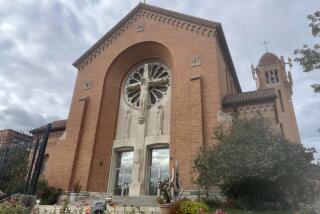Parishioners Fight for Croatian Church
- Share via
STEELTON, Pa. — For three years, parishioners of a church in this gritty steel town have been fighting with their bishop, contending that their Croatian heritage is being undermined by the Catholic diocese’s decision to consolidate parishes.
They have picketed the home of Bishop Nicholas Dattilo of Harrisburg, carrying signs that read, “Save Our Parish, Save Your Soul.” They have arranged for a Croatian bishop from Bosnia to celebrate Mass without Dattilo’s permission. They have celebrated a parish that no longer exists in diocesan eyes.
Tensions escalated in September when the bishop warned in an open letter in the diocese’s newspaper that the parishioners in the St. Mary’s Preservation Society risk “separation” if they do not end their dissent.
“They will no longer be members of the Roman Catholic Church,” said the Rev. T. Ronald Haney, spokesman for the diocese. “They have been absolutely disrespectful, disobedient, and they owe the bishop a public act of apology.”
But Chuck Wilson, a legal expert who helps Catholics challenging church decisions, considers the threat extreme.
“We’ve handled a lot of parish-closing cases, but I’ve never seen anything like this, with people being threatened with penalties,” said Wilson, director of the St. Joseph’s Foundation in San Antonio. “The law of the church says penalties should be used as a last resort, and this certainly isn’t a last resort.”
In 1995, the diocese consolidated five ethnic parishes--German, Italian, Irish, Slovenian and Croatian--into Prince of Peace parish. The 81-year-old red brick Croatian church, formerly known as St. Mary’s, was made the parish church.
“They suppressed the Croatian parish into an American-based, English-speaking parish,” said Joanne Zalek, president of the St. Mary’s Preservation Society.
Zalek, a second-generation Croatian American, said parishioners want their culture alive in the church, not just for their heritage but for new immigrants.
“Since the Bosnian war we’ve had many refugees settle in this area,” Zalek said. “They’re not comfortable yet with the language.”
In Pennsylvania, about 78,000 claim Croatian ancestry, including about 3,400 in Dauphin County, where the parish is located.
More to Read
Sign up for Essential California
The most important California stories and recommendations in your inbox every morning.
You may occasionally receive promotional content from the Los Angeles Times.












